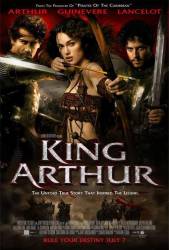Continuity mistake: In the scene where the knights are sitting at the round table near the beginning of the movie one of the knights has a plus sign shaped scar on his forehead. In the next shot,the same knight now has a sideways cross shaped scar. The scar changes almost every shot throughout the scene.
Continuity mistake: The knights reach the outpost beyond the wall. One of the knights reports to Arthur that the Saxons are approaching. During the exchange he's shown with his hair pushed off his face, then its covering one side of his face, then its off again.
Continuity mistake: During the battle at the end of the movie, the first wave of Saxon infantry is sent through the open door in Hadrian's Wall, and then it closes behind them. Mayhem ensues. All but one of the soldiers escapes after the Wodes fire arrows at them while the Knights ride them down. The single survivor staggers through the opening doors (which open just a crack, enough for the guy to slip through), and then stands there, and in that shot we see the doors behind him are now closed. An instant later, it cuts to the hillside where the Knights are standing on their horses looking down at the wall, and we see the doors both standing wide open. Scene cuts back, and we see they're closed again.
Continuity mistake: When we see Tristan's bird for the first time, the shots changes between close up and distance. In the distance shot you see both of Tristan's arms out in the air, but in the close ups both before and after, it's only one arm out in the air.
Continuity mistake: In the scene by Arthur's father's grave, Guinevere places her hand on Arthur's cheek. As the camera shot moves from front to back you see her thumb move from on his cheek to off again several times from one shot to the next.
Continuity mistake: When the knights & the Bishop are around the round table, the Bishop's assistant is heard saying to Jols (after introducing Bishop Germanius), "A round table? What sort of evil is this?" and he is not on screen. Jols, however, is and he stands as though there is no one talking to him. In the very next shot he is looking at the assistant and speaks to him as though they were talking the whole time. (00:21:50)
Continuity mistake: When Cerdic is about to kill Arthur on the final battle, look at Cerdic's hair which changes position on his forehead during close-ups.
Continuity mistake: When Cedric holds wounded Tristan to show his triumph to Arthur, the underdog is standing (you see his head at the height of Cedric's), next (when he looks at his falcon) he is kneeling, and when Tristan receives his deathblow, he's standing again. (01:44:35)
Continuity mistake: In the shot of Bors (during Venora's singing), Galahad is shown in the back with Gawain being the closest knight to him, a stream directly behind, and a wall far behind. Cut to Lancelot, then to Tristan who is near a wall, then to Galahad with Tristan right behind him and the wall closer.
Continuity mistake: When Cerdic calls for the main body of the Saxons to go through the door Cynric is shown drawing his sword, waving it over his head and yelling. In the next shot seconds later his sword is sheathed and he is walking calmly beside his father.






Answer: At the beginning of the film, we learn that young Sarmatians were drafted into the Roman military for a period of fifteen years. As the Romans lead young Lancelot away from his family, his father yells 'Rus!', the war-cry that is repeated throughout the film. 'Sarmatian' was the name the Romans gave the Rus, descendants of Norsemen who had settled in lands that still bear their name today: the River Rus (in modern Romania), Russia, Belarus, and Ruthenia. Culturally and geographically, these people were the Rus. So when they were inducted into the Roman army, their war cry of 'Rus!' identified them as being fearsome Rus/Sarmatian warriors, warned their opponents that the Rus were coming for them, celebrated their cultural identity, and symbolized their hope of returning home to the Rus. In the film Arthur honors them by yelling it back, signifying the unusual bond between leader and soldier exemplified in the Round Table, Arthur's respect for the Rus warriors, and his commitment to the idea that all men are born free and have the right to their own lives and beliefs.
Rus were a people combined of Vikings traveling between Denmark and Byzantium, and Slavic people. Sarmatians were before that, but from the same area and did intermingle with Slavs, so their blood is more than likely in there.
Rus was not from Denmark.
RUS is the word for Vikings who ruled the city of Kyev, and by the Ryrik family which assembled many Slavic tribes into "Kyev Rus", which is the name of state and foundation of modern Russia. Russia" as a ethnonim is similar to Rus but is not. Russian call themselves "I am Rus, I am ruski", and their language "ruski", but their country is "Russia" and they are RussiaNS, old name coresponding to Latin word "Ratio" (sense, mind) Race -of people...Sarmatians are Serbs, Serbs are Slavs and old Russians.
Ruthenia was the Roman name for what is now Ukraine. The main part of Rus i.e. Kyivan Rus is actually the land and people who are now known as Ukrainians. The Sarmatians were our ancestors.